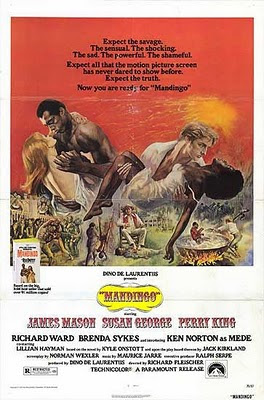Mandingo

When it first came out, many critics loathed Mandingo . They said it was a pulp potboiler, a racist exploitation film, softcore porn, immoral. Roger Ebert gave it zero stars and called it "a piece of manure" and "racist trash". It did just fine at the box office in 1975, the year it was released, but its reputation as laughably and/or offensively awful stayed with it, keeping it out of circulation for a long time. It's only been generally available on DVD for a couple of years now. In 1976, Andrew Britton wrong a long and careful vindication of the film , but his essay was not widely read. Britton noted how many of the reviewers didn't seem to have paid much attention to the film itself, given how many simple errors about the plot and character relationships filled their reviews. More famously (if academic press books by film scholars can qualify as "famous"), Britton's teacher and colleague Robin Wood devoted a chapter of Sexual Pol...








